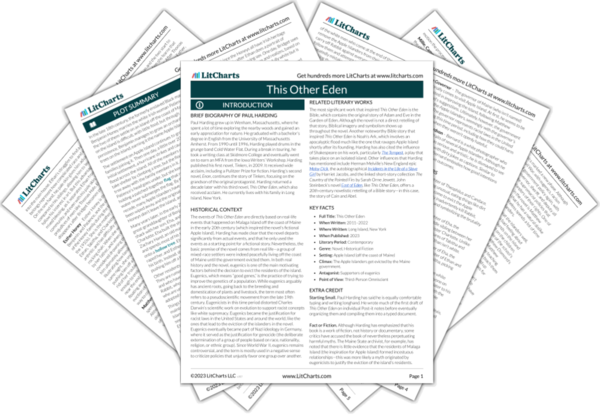Patience Honey Quotes in This Other Eden
Benjamin Honey—American, Bantu, Igbo—born enslaved—freed or fled at fifteen, only he ever knew—ship’s carpenter, aspiring orchardist, arrived on the island with his wife, Patience, née Raferty, Galway girl, in 1793.
[…] I held that foolish flag as high as I could, and the water rose up my shoulder, and the water rose up to my raised elbow, and the water rose up my forearm, and the water reached my wrist, and so there was just my one hand holding that motley little tattered flag sticking up above the surface of the flood, and the waters rose up my fingers, and just as my hand was about to disappear and that flag and all us Honeys be swallowed up in the catastrophe, the water stopped rising.
Bridget had an abashed affection for the man but he seemed like a living memorial, or like a guardian spirit, or quite what she could not say, but that an inner decorum and formality and modesty of manner were required when she was with him, which she loved and which she felt with no one else. He alone made her feel as if her work, her life, in America, the awful trip over the ocean, being away from her mother and father—so far away it barely felt real anymore, felt as if her sorrow and longing were for people and places her imagination had invented—Mr. Hale alone could make her feel as if her job were important enough to bear being an orphan.
As the light left the sky, John Thorpe saw Zachary Hand to God wading away from the island across the channel, chest-deep in the water. Zachary held what looked like an old faded and patched flag bundled and knotted together by the corners above his head. His silhouette cut through the invisible current of the tide and to Thorpe he looked like a threadbare angel abandoning the wrecked ship over which he’d once been guardian, light fanning across the water behind him as he pushed against the incoming flood.

Patience Honey Quotes in This Other Eden
Benjamin Honey—American, Bantu, Igbo—born enslaved—freed or fled at fifteen, only he ever knew—ship’s carpenter, aspiring orchardist, arrived on the island with his wife, Patience, née Raferty, Galway girl, in 1793.
[…] I held that foolish flag as high as I could, and the water rose up my shoulder, and the water rose up to my raised elbow, and the water rose up my forearm, and the water reached my wrist, and so there was just my one hand holding that motley little tattered flag sticking up above the surface of the flood, and the waters rose up my fingers, and just as my hand was about to disappear and that flag and all us Honeys be swallowed up in the catastrophe, the water stopped rising.
Bridget had an abashed affection for the man but he seemed like a living memorial, or like a guardian spirit, or quite what she could not say, but that an inner decorum and formality and modesty of manner were required when she was with him, which she loved and which she felt with no one else. He alone made her feel as if her work, her life, in America, the awful trip over the ocean, being away from her mother and father—so far away it barely felt real anymore, felt as if her sorrow and longing were for people and places her imagination had invented—Mr. Hale alone could make her feel as if her job were important enough to bear being an orphan.
As the light left the sky, John Thorpe saw Zachary Hand to God wading away from the island across the channel, chest-deep in the water. Zachary held what looked like an old faded and patched flag bundled and knotted together by the corners above his head. His silhouette cut through the invisible current of the tide and to Thorpe he looked like a threadbare angel abandoning the wrecked ship over which he’d once been guardian, light fanning across the water behind him as he pushed against the incoming flood.











